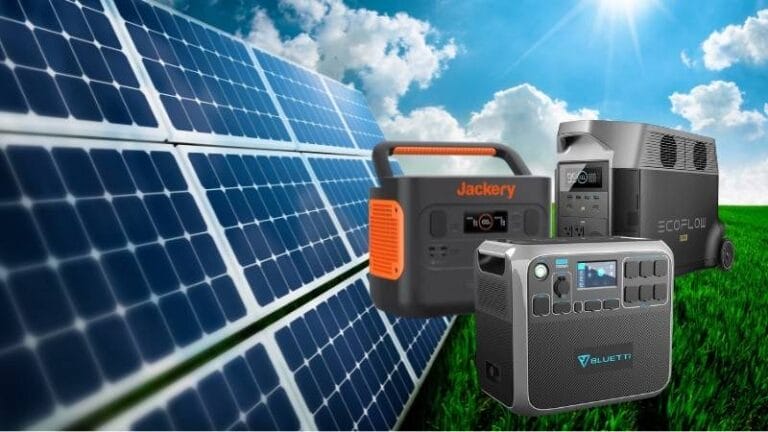Our world is rapidly shifting towards renewable energy sources, and solar generators are gaining popularity as a clean, sustainable, and environmentally friendly power solution.
What is a solar generator, you might ask?
Simply put, a solar generator is like your everyday electric generator, but instead of using fuel or gas, it harnesses the abundant power of the sun. It’s all about turning sunlight into usable electricity. Cool, right?
In this blog post, we’ll explore the ins and outs of solar generators, their benefits, and how to choose the right one for your needs.
Key Takeaways
- Solar generators are a portable, eco-friendly energy source used in various applications.
- Components include solar panels, charge controllers, batteries, and inverters to collect and store energy.
- Benefits of solar generators include portability for outdoor activities or emergency preparedness with reduced environmental impact from noise & air pollution.
What Is a Solar Generator?
A solar generator is a system that uses solar panels to capture sunlight, converting it into electricity, and storing it in a battery for use when you need it.
These are also known as portable solar generators or solar-powered generators. The good thing is that they’re environmentally friendly and offer renewable energy while fulfilling the same purpose as traditional gas generators.
They are often employed for a variety of applications such as RV camping, boats, and as a backup power supply in the event of a grid power failure. But these handy devices are not just for outdoor enthusiasts. In our homes, larger home solar generators could serve as a dependable backup power source during blackouts. In areas with frequent power outages, they are a godsend, ensuring you’re never left in the dark.
When selecting the best solar-powered generator, it is important to consider factors such as the quality and size of the generator, the lifestyle and usage, the number of devices or appliances, the length of time and frequency of usage, and the amount of energy stored in the internal battery.
These innovative power solutions are gaining traction as a more sustainable alternative to traditional gas-powered generators, which rely on fossil fuels and emit harmful fumes. In contrast, solar generators work by capturing sunlight and transforming it into electrical energy, making them a cleaner and more eco-friendly choice for powering devices and appliances.
In addition, they’re silent operators. Ever tried having a conversation next to a traditional generator? It’s like trying to talk over a roaring jet engine. Solar generators work quietly, causing no noise pollution.
Components of a Solar Generator
Now that we have a grasp of what a solar generator is, let’s peek under the hood and examine the key components that work together.
A solar power generator typically comprises four components —
- Solar panels,
- Charge controller,
- Solar Battery, and
- Inverter
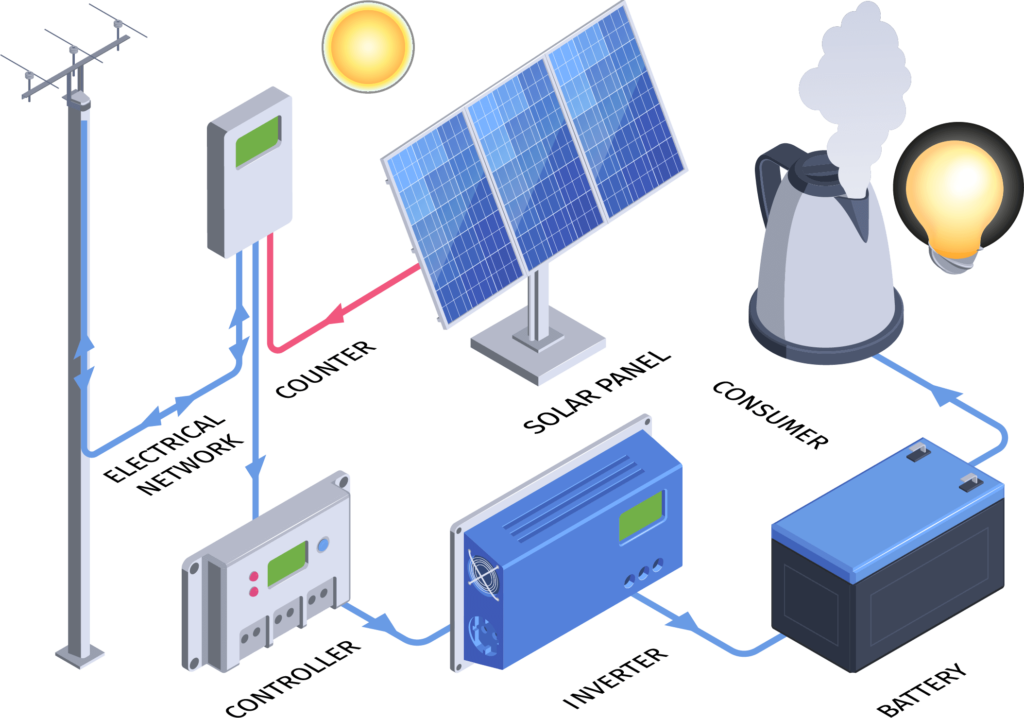
Solar Panels
These are the frontline soldiers in a solar generator.
They are made of photovoltaic cells that capture sunlight and start the conversion process from light energy into electrical energy. They’re like the kitchen of the generator, where the “cooking” begins.
Charge Controller
Imagine a world without traffic lights; chaos, right?
Similarly, in a solar generator, the charge controller is the traffic cop. It regulates the voltage and current coming from the solar panels going to the battery.
It prevents overcharging and makes sure that the battery is charged efficiently and safely.
Solar Battery
This component is the “warehouse” of the system.
It stores the electricity generated by the solar panels for later use. The capacity of the battery determines how much power you can store, and consequently, how long your generator can run when there’s no sun.
Most modern solar generators feature an integrated lithium-ion solar battery, providing a more efficient and long-lasting energy storage solution.
Inverter
Finally, we have the inverter or the pure sine wave inverter, the translator in our system.
The energy produced by solar panels and stored in the battery is direct current (DC). However, most of our appliances use alternating current (AC). The inverter’s job is to convert DC into AC, making the electricity usable for our devices.
How Do Solar Power Generators Work?
Now that we’ve got the team members introduced, let’s get into the action and see how these components interact in this energy-producing symphony.
The whole process begins when the sun rises and the solar panels get to work. They absorb sunlight and convert it into direct current (DC) electricity. This is where the photovoltaic effect we talked about comes into play – the phenomenon that makes the magic of solar energy possible.
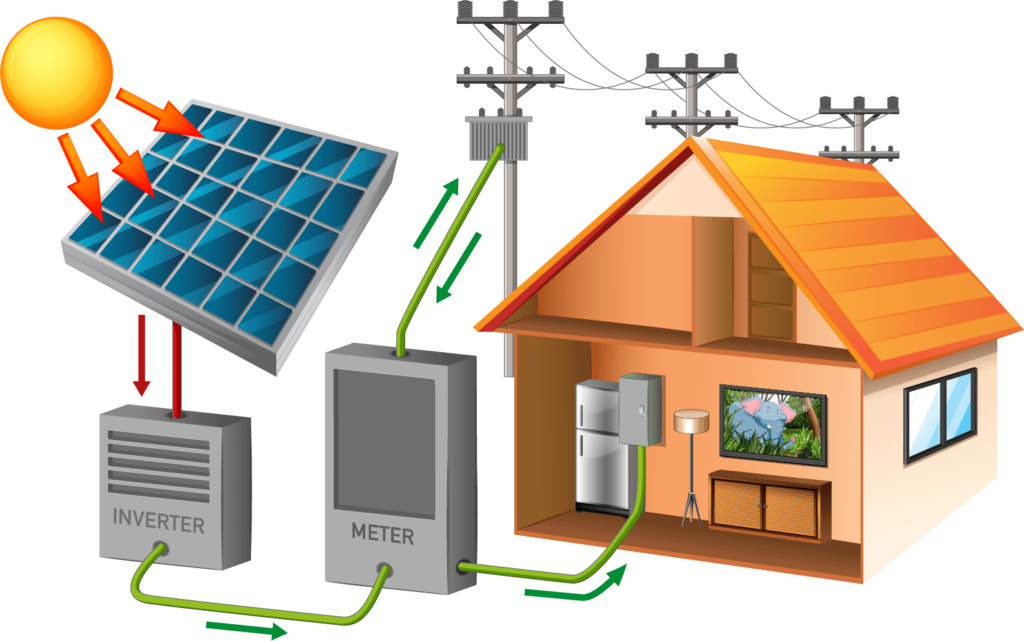
Next up is our traffic cop, the charge controller. It steps in to control the flow of electricity, preventing any potential overflow and ensuring the battery doesn’t overcharge.
The electricity then flows into the solar battery, our energy storage unit. This battery stores the power for use when the sun isn’t shining, such as during nights or cloudy days.
Lastly, when it’s time to use the stored power, the inverter comes into action. It transforms the DC electricity stored in the battery into AC electricity that your appliances can use.
Voila! You’ve got power courtesy of the sun!
The process repeats itself every day, providing a reliable and eco-friendly power source. That’s solar power generators for you—simple, sustainable, and smart!
Types of Solar Generators
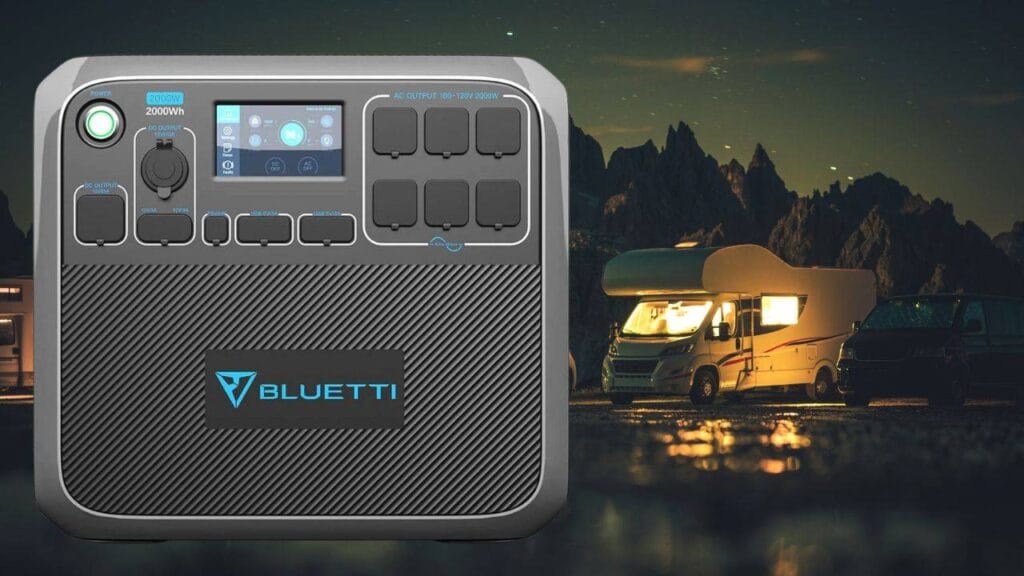
Solar generators can be categorized into three primary types based on their connection to the utility grid:
- On-Grid Solar Generators
- Off-Grid Solar Generators
- Hybrid Solar Generators
On-Grid Solar Generators
An On-Grid Solar Generator is connected to the local utility grid, representing a partnership between you and your utility company.
Here’s how it works: When your solar generator produces more electricity than you can use, the excess is fed back into the grid. This earns you credits with your utility company, which can offset your electricity bill. It’s ideal for powering your entire house.
When selecting an On-Grid Solar Generator, it is important to take into account factors such as battery capacity, sine wave inverter, and lithium-ion batteries. These generators contribute to a decrease in the environmental impact of electricity production by harnessing clean, renewable energy from the sun.
However, there’s a downside. On-Grid systems depend on the grid to function, so during a power outage, you might be left in the dark.
Off-Grid Solar Generators
An off-grid solar generator is a self-contained unit that generates electricity from solar panels and stores it in batteries for later use.
It is specifically designed to provide power in remote locations where there is no access to the grid electricity supply, making it ideal for camping, boating, and other off-grid applications.
It’s a great option if you want complete control over your energy supply.
However, to ensure a steady power supply, especially during nights or cloudy days, off-grid systems need to be paired with a robust battery storage system, which can make them more expensive.
Hybrid Solar Generators
As the name suggests, these generators combine the best of both worlds.
Hybrid solar generators are an innovative approach to power generation that combine traditional fuel-based technology with renewable energy sources for a high-efficiency energy system. They leverage the power of the sun and the reliability of conventional fuel sources such as natural gas or propane, thus providing a consistent power supply.
In the daytime, these hybrid systems collect and convert sunlight into electricity through the use of solar panels. The energy generated is then stored in batteries for future use.
During times of insufficient sunlight, like during the night or on cloudy days, the system relies on the traditional fuel-powered generator to provide the necessary power. The process is well-coordinated and automated, which ensures a continuous and uninterrupted power supply, regardless of the weather conditions or time of day.
It’s like having a safety net for your safety net!
Benefits of Solar Generators
Solar generators offer numerous advantages, including reduced environmental impact and noise pollution. They do not require fuel, are a clean power source, require low maintenance, and provide a quiet solution, making them an attractive alternative to traditional gas generators.
Environmental Impact
Solar generators produce clean, renewable energy, reducing reliance on fossil fuels and lowering carbon emissions. By harnessing the sun’s energy, solar generators decrease the need for fossil fuels and associated carbon emissions, providing an environmentally friendly power source that is in stark contrast to traditional gas generators.
Gas-powered generators emit potentially hazardous gases into the atmosphere, such as carbon dioxide, carbon monoxide, nitrous oxides, and sulfur oxides.
In contrast, solar generators generate clean, renewable energy, reducing the environmental impact of electricity production and contributing to a greener future for our planet.
Noise and Air Pollution Reduction
Solar generators operate silently and do not emit harmful fumes, making them a healthier and more pleasant alternative to traditional generators.
This is particularly important for those who value a quiet environment, such as campers, RV users, and anyone living in close proximity to their power source.
In addition to being environmentally friendly, solar generators provide a more pleasant user experience by eliminating the noise and air pollution associated with traditional gas generators.
This makes solar generators ideal for those seeking a clean, quiet, and sustainable power solution for their home, RV, or outdoor adventures.
Portability
Especially with smaller, off-grid models, solar generators are incredibly portable. They’re your perfect companion for camping trips, outdoor events, or any situation where you need power on the move.
Plus, they’re a boon for people living in remote areas without reliable grid access.
Low Maintenance
Solar generators have fewer moving parts than traditional generators, reducing the risk of mechanical failure.
Apart from occasional cleaning and ensuring the components are in good condition, they require little maintenance. Less upkeep means less hassle!
Financial Advantage
While the initial investment may be higher, solar generators can save you money in the long run.
Remember, sunlight is free!
Once your system is up and running, you can generate electricity without ongoing fuel costs. And if you’re using an on-grid system, you can earn some credits on your utility bill.
Solar Generators vs. Traditional Gas-Powered Generators
When it comes to solar generators, here’s how solar stacks up against traditional gas-powered options.
Pros and Cons of Solar Generators
Pros
Cons
- Eco-Friendly: No harmful emissions, minimal environmental impact.
- Quiet Operation: Near-silent, ideal for peaceful environments.
- Low Maintenance: Fewer moving parts, less upkeep.
- No Ongoing Fuel Costs: Sunlight is free, no fuel costs after setup.
- Dependency on Weather: Less effective on cloudy days, no power generation at night.
- Upfront Costs: Higher initial costs due to solar panels and batteries.
Pros and Cons of Gas-Powered Generators
Pros
Cons
- Powerful: Can produce more power, suitable for heavy-duty appliances.
- Consistent Power Supply: Works irrespective of weather or time of day, as long as there's fuel.
- Environmental Impact: Runs on fossil fuels, and emits greenhouse gases.
- Noise and Air Pollution: Can be noisy and produces exhaust fumes.
- Ongoing Fuel Costs: Requires regular supply of fuel, adding to operating costs.
In short, solar generators shine for sustainability, quiet operation, and lower running costs, while gas generators excel in power output and consistency, regardless of weather conditions. Your choice depends on your specific needs and values!
Choosing the Right Solar Generator
Selecting the right solar generator involves considering various factors, such as battery capacity, sine wave inverter, and lithium-ion batteries.
By evaluating your power needs and taking these factors into account, you can ensure that you choose the most suitable solar generator for your specific requirements.
It is important to consider the size of the battery, the type of inverter, and the size of the battery.
Battery Capacity
The capacity of a solar generator’s battery is measured in watt-hours (Wh) and determines the duration of the battery’s power supply as well as the number of devices it can power. The higher the watt-hours, the longer the battery lasts, allowing for more extended usage and powering of multiple devices.
When selecting a solar generator, it is essential to consider the battery capacity, as it will impact the generator’s ability to provide power during emergency blackouts or outdoor trips.
A higher battery capacity will ensure that you have a reliable power source when you need it most, making it a critical factor in choosing the right solar generator.
Sine Wave Inverter
A sine wave inverter is an electronic device that converts direct current (DC) into alternating current (AC). It is utilized in solar generators to provide a consistent and pure power output, safeguarding delicate electronics from potential harm.
By ensuring a stable and clean power output, sine wave inverters protect sensitive electronics and help reduce noise and air pollution.
When selecting a solar generator, it is vital to consider the type of sine wave inverter, as it will impact the overall performance and reliability of the generator.
A high-quality sine wave inverter will contribute to a better user experience and a more reliable power source for your devices and appliances.
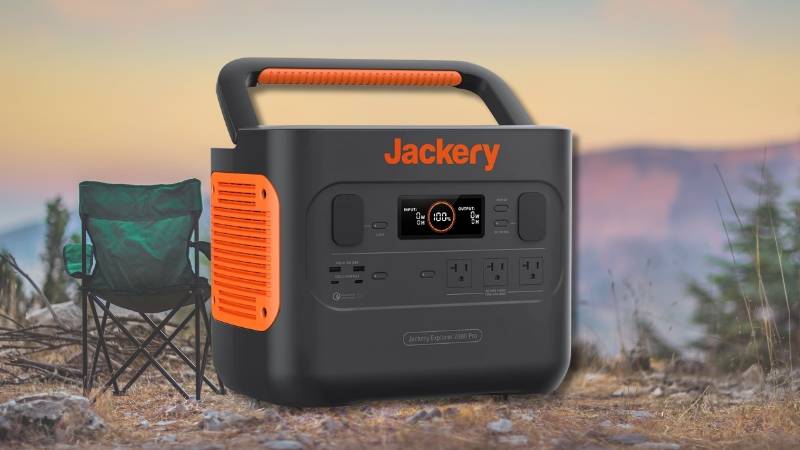
Lithium-Ion Batteries
Lithium-ion batteries are the preferred choice for solar generators due to their increased safety and economical longevity. These batteries offer several advantages over lead-acid batteries, such as being lighter, more compact, and having a longer lifespan.
However, the cost of lithium-ion batteries is relatively high. So, when selecting a solar generator, it is important to consider the type of battery and weigh the benefits of lithium-ion batteries against their cost.
Choosing a solar generator with a high-quality lithium-ion battery can ensure a more efficient and long-lasting power source for your devices and appliances.
Solar Generator Use Cases and Applications
Solar generators, also known as solar power generators, are versatile and can be used for various purposes, such as outdoor activities and emergency preparedness. Their ability to provide clean, renewable energy without the need for fuel makes them an attractive choice for a wide range of applications.
Solar generators are a great way to reduce your carbon footprint and save money on energy costs.
Outdoor Activities
Solar generators are perfect for camping, boating, and RV trips, providing a reliable power source for charging devices and running small appliances.
Their clean and renewable energy source, minimal maintenance, and quiet operation make solar generators ideal for outdoor enthusiasts who value the environment and their comfort.
By calculating the amount of energy used by the devices and appliances during your outdoor activities, you can ensure that you select a solar generator with the appropriate storage capacity to meet your needs.
This will guarantee a reliable power source for your devices and appliances, allowing you to enjoy your outdoor adventures without worrying about running out of power.
Emergency Preparedness
Solar generators serve as a backup power source during power outages, ensuring the continuous operation of essential devices and appliances.
Their ability to produce clean, renewable energy without the need for fuel makes them an attractive option for emergency preparedness, providing a reliable power source when the grid fails.
Whether you’re preparing for a natural disaster or simply want to have a reliable backup power source for your home, solar generators offer a clean, quiet, and sustainable solution.
By investing in a solar generator, you can rest assured that when the sun rises, you’ll still be able to power and operate your devices and appliances, even during a power outage.
Off-Grid Living
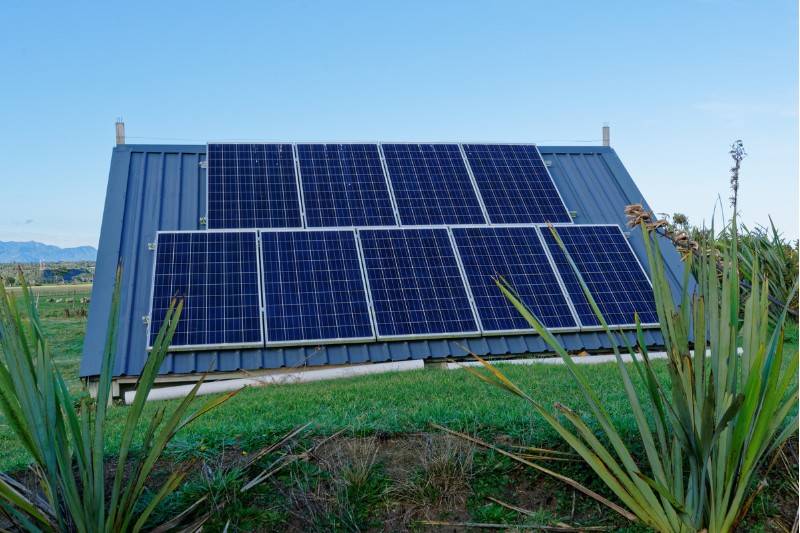
For those living in remote locations, solar generators can be the primary source of electricity. They offer independence from the utility grid, allowing you to harness the power of the sun wherever you are.
Events and Market Stalls
Running an outdoor event or a market stall? A solar generator can provide clean, quiet power for your lighting, electronic equipment, or even food stalls. No more noisy generators or long extension cords!
Construction Sites
Portable solar generators can also be used to power tools at off-grid construction sites, providing a reliable, eco-friendly power solution in locations where electricity is not yet available.
Final Words
We’ve journeyed through the world of solar generators, understanding what a solar generator is, how they work, their different types, benefits, and various use cases.
These remarkable devices offer an eco-friendly, quiet, and portable power solution that’s ideal for a wide range of applications, from home backup to outdoor adventures.
By choosing solar generators, you’re not just selecting a sustainable energy option but investing in a brighter, greener future for our planet.
So, whether you’re planning your next camping trip or seeking an emergency power backup, remember to let the sun power your choice.
Choose solar, choose sustainability!
Frequently Asked Questions (FAQ)
Yes, a solar generator can power a whole house, depending on the size of the generator and the household’s energy consumption. The size of the generator will determine how much energy it can produce, while the household’s energy consumption will determine how much energy is needed.
A solar generator is a device that combines solar panels, batteries, chargers, and inverters to capture, store, and distribute energy from the sun. It can be used for camping, RV trips, boating, emergency preparedness, and other situations.
A solar generator utilizes solar panels to directly convert sunlight into usable energy, while a solar inverter takes existing power from a battery or other direct current source and converts it to alternating current. Thus, a solar generator produces electricity, while an inverter simply changes the form of already-existing electricity.
Solar generators require a large upfront investment, take a long time to recharge, and have low wattage capacity that limits the amount of power they can store and generate. Additionally, solar generators cannot generate power without sunlight.
Solar generators capture the power of the sun to generate electricity, while gas generators require the combustion of fossil fuels for the same purpose.
